The Cambridge History of China. Vol. 12: Republican China, 1912-1949, Part 1
Подождите немного. Документ загружается.

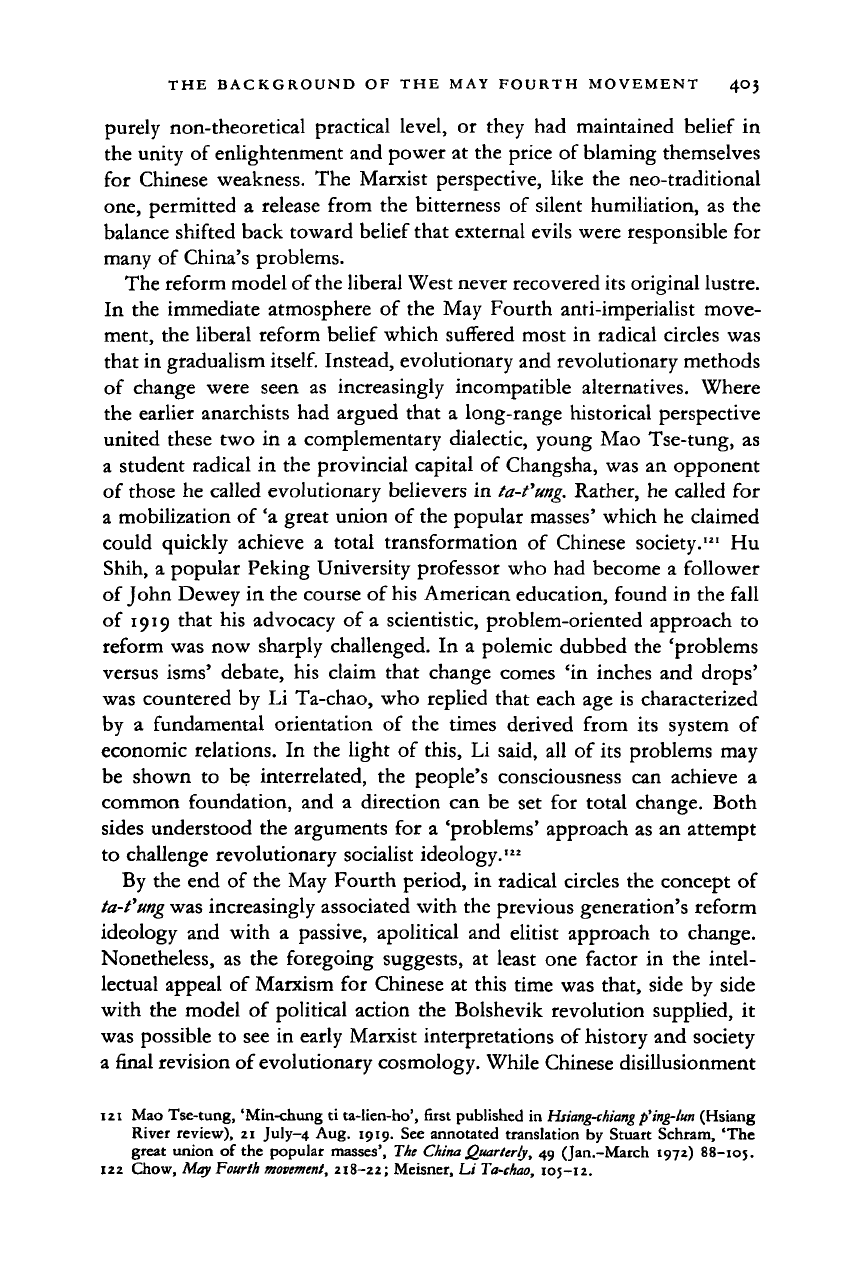
THE BACKGROUND OF THE MAY FOURTH MOVEMENT 40J
purely non-theoretical practical level,
or
they had maintained belief
in
the unity of enlightenment and power at the price of blaming themselves
for Chinese weakness. The Marxist perspective, like the neo-traditional
one,
permitted
a
release from the bitterness
of
silent humiliation, as the
balance shifted back toward belief that external evils were responsible for
many
of
China's problems.
The reform model of the liberal West never recovered its original lustre.
In the immediate atmosphere
of
the May Fourth anti-imperialist move-
ment, the liberal reform belief which suffered most in radical circles was
that in gradualism
itself.
Instead, evolutionary and revolutionary methods
of change were seen
as
increasingly incompatible alternatives. Where
the earlier anarchists had argued that
a
long-range historical perspective
united these two
in a
complementary dialectic, young Mao Tse-tung,
as
a student radical
in
the provincial capital
of
Changsha, was an opponent
of those he called evolutionary believers in
ta-t'ung.
Rather, he called for
a mobilization
of
'a great union of the popular masses' which he claimed
could quickly achieve
a
total transformation
of
Chinese society.
121
Hu
Shih,
a
popular Peking University professor who had become
a
follower
of John Dewey in the course of his American education, found in the fall
of 1919 that his advocacy
of
a scientistic, problem-oriented approach
to
reform was now sharply challenged. In
a
polemic dubbed the 'problems
versus isms' debate,
his
claim that change comes
'in
inches and drops'
was countered by Li Ta-chao, who replied that each age is characterized
by
a
fundamental orientation
of
the times derived from
its
system
of
economic relations.
In
the light
of
this, Li said, all of its problems may
be shown
to be
interrelated,
the
people's consciousness can achieve
a
common foundation, and
a
direction can
be set for
total change. Both
sides understood the arguments for
a
'problems' approach as an attempt
to challenge revolutionary socialist ideology.'
22
By the end
of
the May Fourth period, in radical circles the concept of
ta-t'uttg
was increasingly associated with the previous generation's reform
ideology and with
a
passive, apolitical and elitist approach
to
change.
Nonetheless,
as
the foregoing suggests,
at
least one factor
in
the intel-
lectual appeal
of
Marxism for Chinese
at
this time was that, side by side
with the model
of
political action the Bolshevik revolution supplied,
it
was possible to see in early Marxist interpretations of history and society
a final revision of evolutionary cosmology. While Chinese disillusionment
121 Mao Tse-tung, 'Min-chung
ti
ta-lien-ho', first published in
Hsiang-chiang
p'ing-lun
(Hsiang
River review), 21 July-4 Aug. 1919. See annotated translation
by
Stuart Schram, 'The
great union
of
the popular masses', The
China
Quarterly, 49 (Jan.-March 1972) 88-105.
122 Chow, May
Fourth
movement,
218-22; Meisner, LJ
Ta-chao,
105-12.
Cambridge Histories Online © Cambridge University Press, 2008
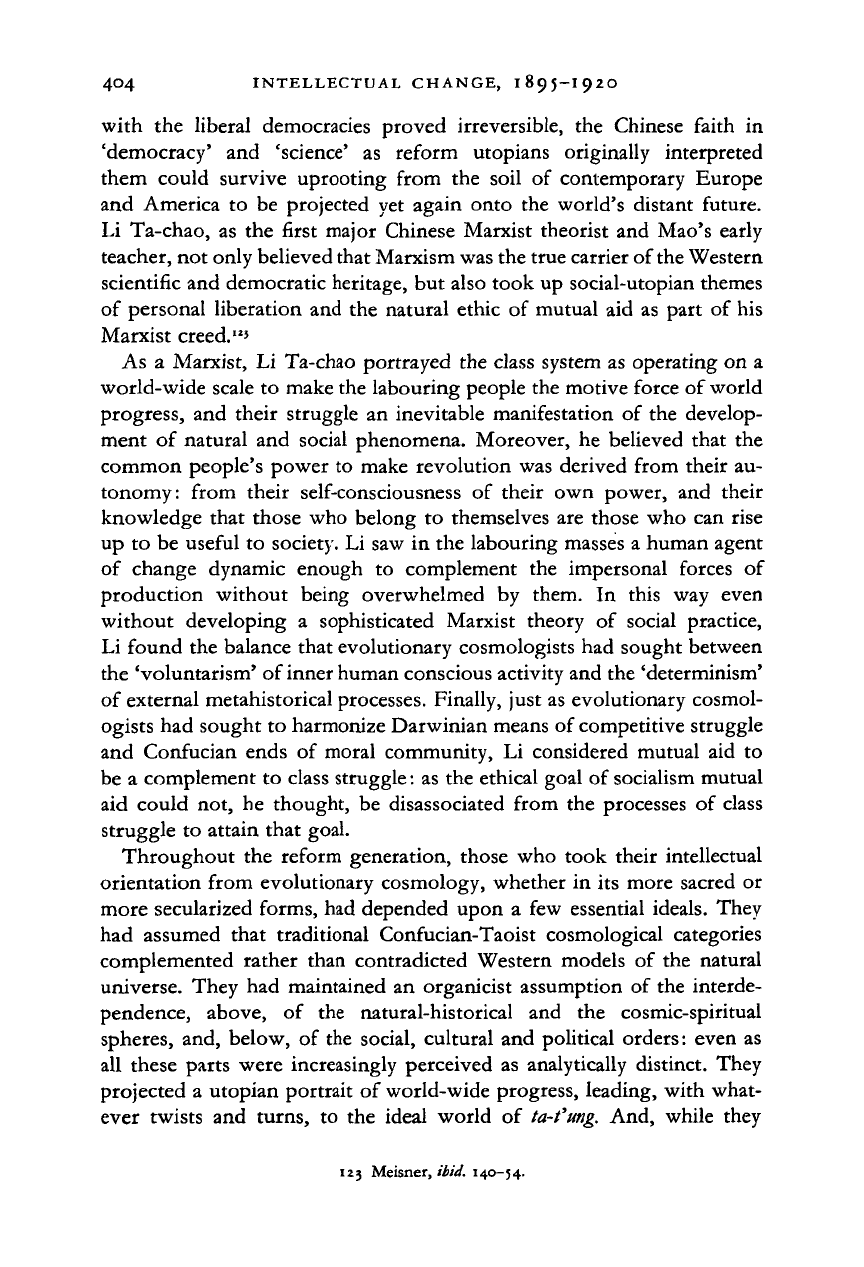
404 INTELLECTUAL CHANGE, 1895-I92O
with
the
liberal democracies proved irreversible,
the
Chinese faith
in
'democracy'
and
'science'
as
reform Utopians originally interpreted
them could survive uprooting from
the
soil
of
contemporary Europe
and America
to be
projected yet again onto the world's distant future.
Li Ta-chao,
as
the first major Chinese Marxist theorist and Mao's early
teacher, not only believed that Marxism was the true carrier of
the
Western
scientific and democratic heritage, but also took up social-utopian themes
of personal liberation and the natural ethic
of
mutual aid as part
of
his
Marxist creed.
12
'
As
a
Marxist, Li Ta-chao portrayed the class system as operating on
a
world-wide scale to make the labouring people the motive force of world
progress, and their struggle an inevitable manifestation
of
the develop-
ment
of
natural and social phenomena. Moreover,
he
believed that the
common people's power to make revolution was derived from their au-
tonomy: from their self-consciousness
of
their own power,
and
their
knowledge that those who belong
to
themselves are those who can rise
up to be useful to society. Li saw in the labouring masses a human agent
of change dynamic enough
to
complement
the
impersonal forces
of
production without being overwhelmed
by
them.
In
this way even
without developing
a
sophisticated Marxist theory
of
social practice,
Li found the balance that evolutionary cosmologists had sought between
the 'voluntarism' of inner human conscious activity and the 'determinism'
of external metahistorical processes. Finally, just as evolutionary cosmol-
ogists had sought to harmonize Darwinian means of competitive struggle
and Confucian ends
of
moral community,
Li
considered mutual aid
to
be
a
complement to class struggle: as the ethical goal of socialism mutual
aid could not,
he
thought,
be
disassociated from the processes
of
class
struggle to attain that goal.
Throughout the reform generation, those who took their intellectual
orientation from evolutionary cosmology, whether in its more sacred
or
more secularized forms, had depended upon
a
few essential ideals. They
had assumed that traditional Confucian-Taoist cosmological categories
complemented rather than contradicted Western models
of
the natural
universe. They had maintained an organicist assumption
of
the interde-
pendence, above,
of the
natural-historical
and the
cosmic-spiritual
spheres, and, below,
of
the social, cultural and political orders: even as
all these parts were increasingly perceived
as
analytically distinct. They
projected
a
Utopian portrait of world-wide progress, leading, with what-
ever twists
and
turns,
to
the ideal world
of
ta-t'ung.
And, while they
123 Meisner,
ibid.
140-54.
Cambridge Histories Online © Cambridge University Press, 2008
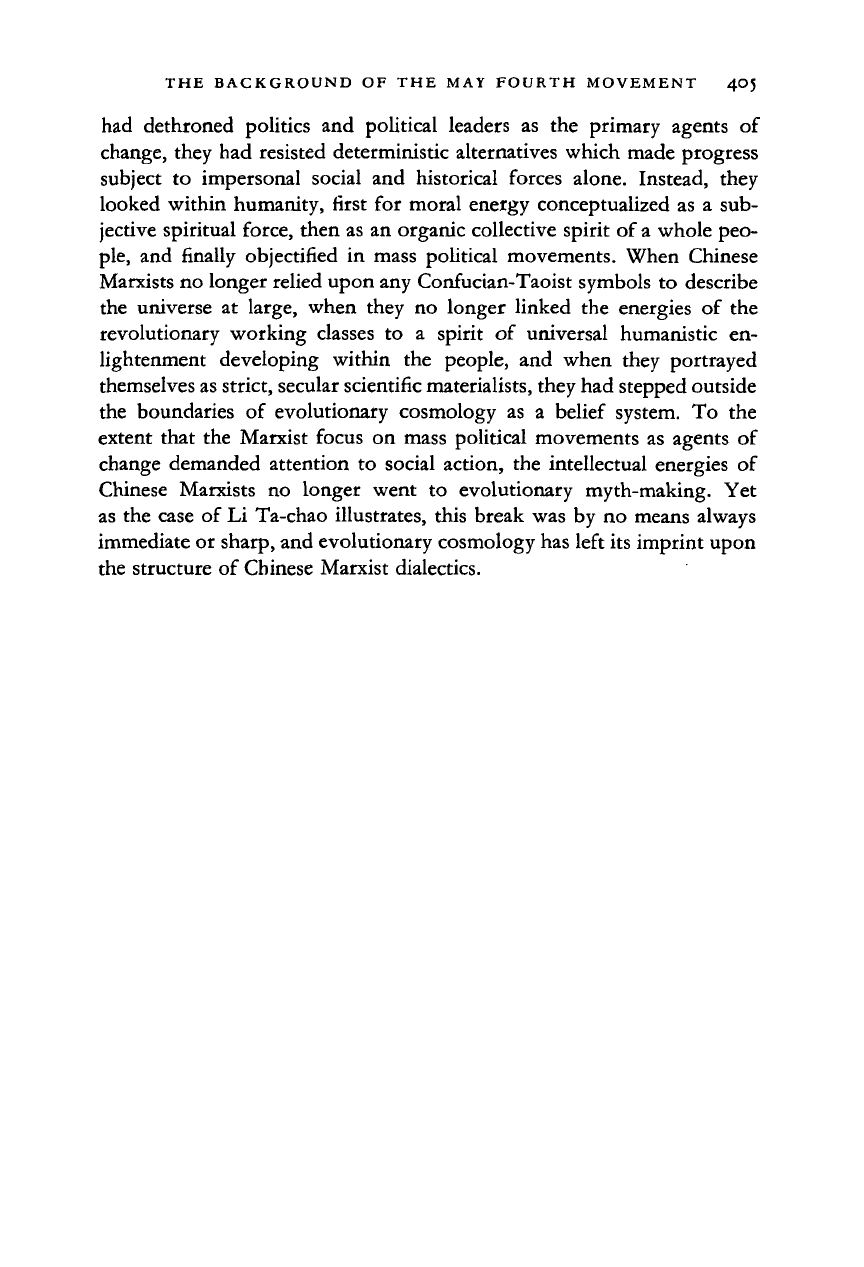
THE BACKGROUND OF THE MAY FOURTH MOVEMENT 405
had dethroned politics
and
political leaders
as the
primary agents
of
change, they had resisted deterministic alternatives which made progress
subject
to
impersonal social
and
historical forces alone. Instead, they
looked within humanity, first
for
moral energy conceptualized as
a
sub-
jective spiritual force, then as an organic collective spirit of a whole peo-
ple,
and finally objectified
in
mass political movements. When Chinese
Marxists no longer relied upon any Confucian-Taoist symbols
to
describe
the universe
at
large, when they
no
longer linked
the
energies
of
the
revolutionary working classes
to a
spirit
of
universal humanistic
en-
lightenment developing within
the
people,
and
when they portrayed
themselves as strict, secular scientific materialists, they had stepped outside
the boundaries
of
evolutionary cosmology
as a
belief system.
To the
extent that the Marxist focus
on
mass political movements
as
agents
of
change demanded attention
to
social action, the intellectual energies
of
Chinese Marxists
no
longer went
to
evolutionary myth-making.
Yet
as the case
of
Li Ta-chao illustrates, this break was by no means always
immediate or sharp, and evolutionary cosmology has left its imprint upon
the structure of Chinese Marxist dialectics.
Cambridge Histories Online © Cambridge University Press, 2008
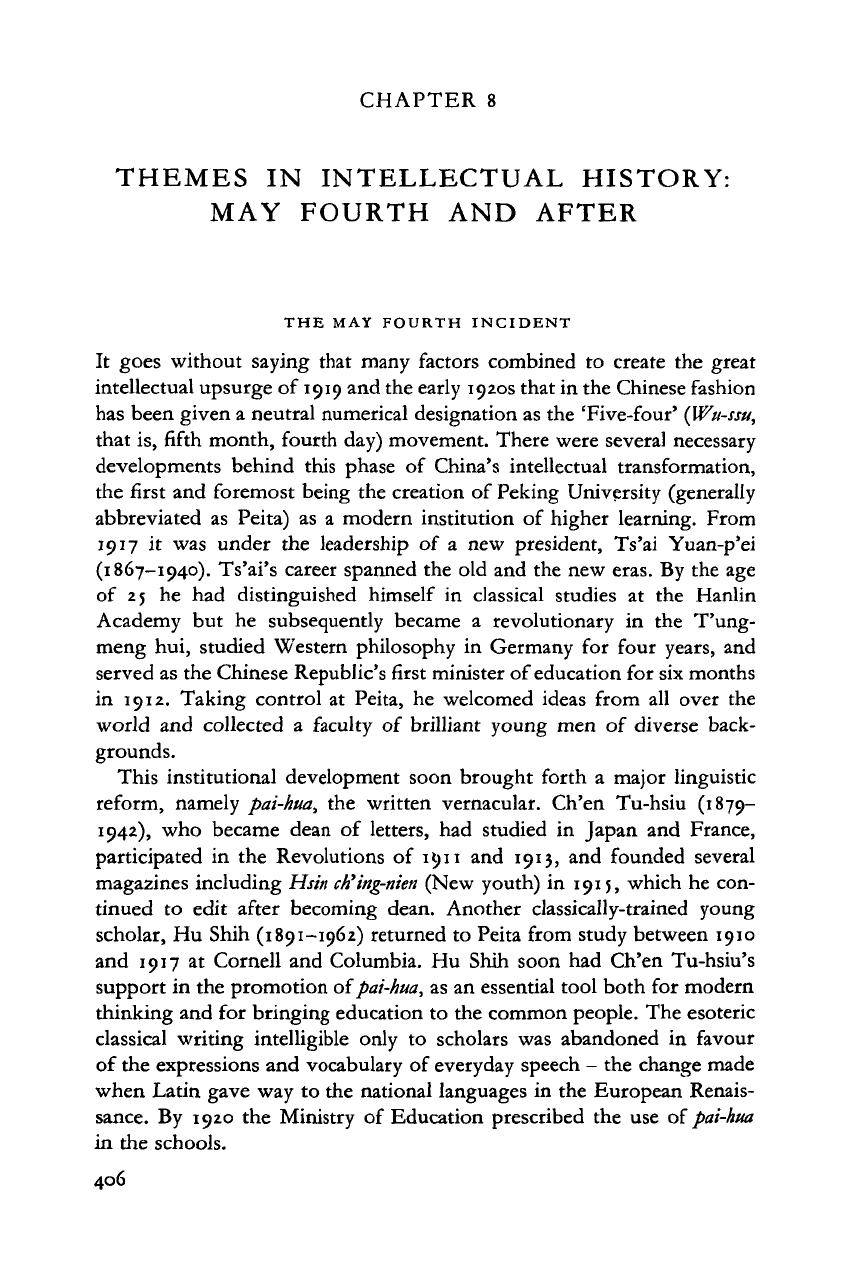
CHAPTER
8
THEMES
IN
INTELLECTUAL HISTORY:
MAY FOURTH
AND
AFTER
THE MAY FOURTH INCIDENT
It goes without saying that many factors combined
to
create the great
intellectual upsurge
of
1919 and the early 1920s that in the Chinese fashion
has been given a neutral numerical designation as the 'Five-four'
(Wtt-ssu,
that is, fifth month, fourth day) movement. There were several necessary
developments behind this phase
of
China's intellectual transformation,
the first and foremost being the creation of Peking University (generally
abbreviated
as
Peita)
as a
modern institution
of
higher learning. From
1917
it
was under
the
leadership
of a
new president, Ts'ai Yuan-p'ei
(1867-1940). Ts'ai's career spanned the old and the new eras. By the age
of 25
he had
distinguished himself
in
classical studies
at the
Hanlin
Academy
but he
subsequently became
a
revolutionary
in the
T'ung-
meng hui, studied Western philosophy
in
Germany
for
four years, and
served as the Chinese Republic's first minister of education for six months
in 1912. Taking control
at
Peita,
he
welcomed ideas from
all
over
the
world
and
collected
a
faculty
of
brilliant young men
of
diverse back-
grounds.
This institutional development soon brought forth
a
major linguistic
reform, namely pai-kua,
the
written vernacular. Ch'en Tu-hsiu (1879-
1942),
who became dean
of
letters,
had
studied
in
Japan and France,
participated
in
the Revolutions
of
1911
and
1913, and founded several
maga2ines including Hsin
ck'ing-men
(New youth)
in
1915, which he con-
tinued
to
edit after becoming dean. Another classically-trained young
scholar, Hu Shih (1891-1962) returned to Peita from study between 1910
and 1917
at
Cornell and Columbia.
Hu
Shih soon had Ch'en Tu-hsiu's
support in the promotion of
pai-hua,
as an essential tool both for modern
thinking and for bringing education to the common people. The esoteric
classical writing intelligible only
to
scholars was abandoned
in
favour
of the expressions and vocabulary of everyday speech
-
the change made
when Latin gave way to the national languages
in
the European Renais-
sance.
By
1920 the Ministry
of
Education prescribed the use of
pai-hua
in the schools.
406
Cambridge Histories Online © Cambridge University Press, 2008
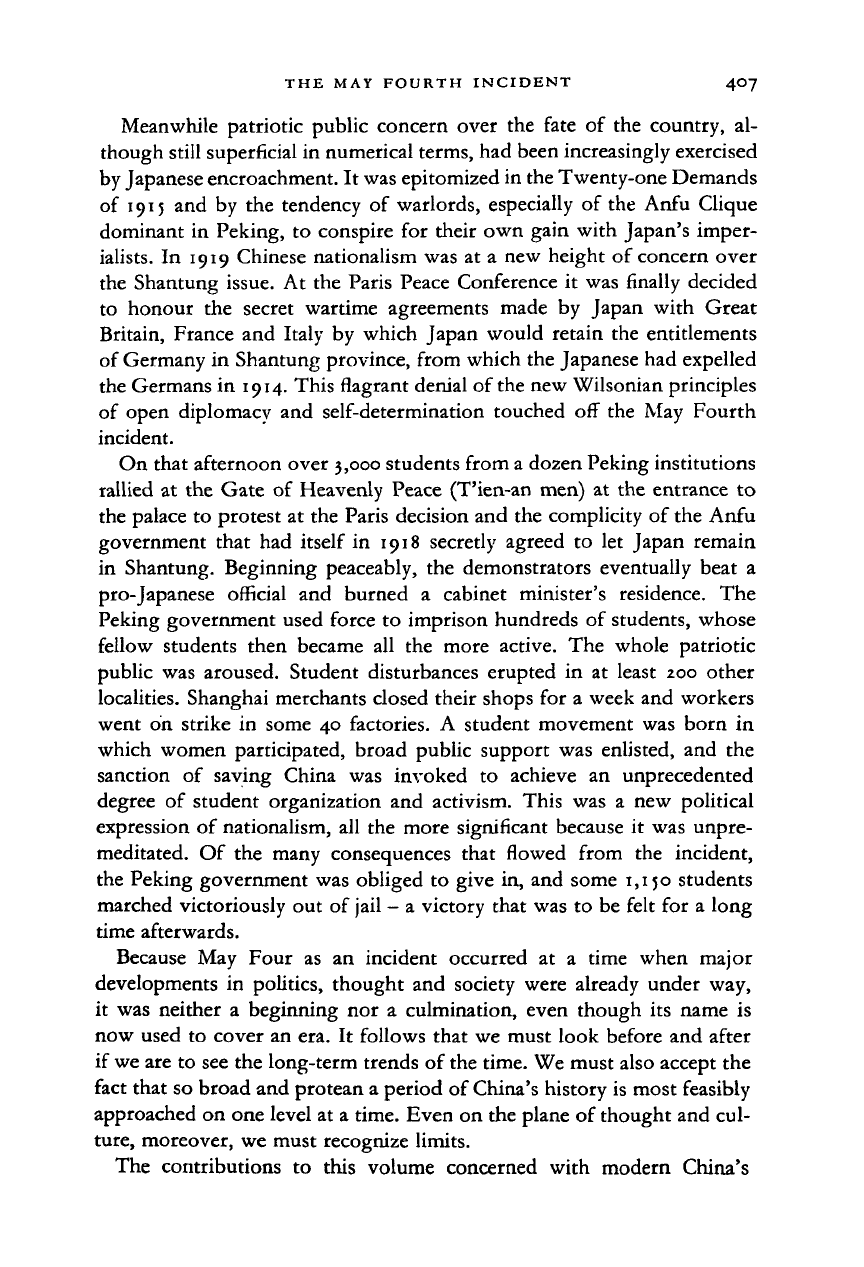
THE MAY FOURTH INCIDENT 407
Meanwhile patriotic public concern over the fate
of
the country, al-
though still superficial in numerical terms, had been increasingly exercised
by Japanese encroachment. It was epitomized in the Twenty-one Demands
of 1915 and by the tendency of warlords, especially of the Anfu Clique
dominant in Peking, to conspire for their own gain with Japan's imper-
ialists. In 1919 Chinese nationalism was at a new height of concern over
the Shantung issue. At the Paris Peace Conference
it
was finally decided
to honour the secret wartime agreements made
by
Japan with Great
Britain, France and Italy by which Japan would retain the entitlements
of Germany in Shantung province, from which the Japanese had expelled
the Germans in 1914. This flagrant denial of the new Wilsonian principles
of open diplomacy and self-determination touched oft" the May Fourth
incident.
On that afternoon over 3,000 students from a dozen Peking institutions
rallied at the Gate of Heavenly Peace (T'ien-an men) at the entrance
to
the palace to protest at the Paris decision and the complicity of the Anfu
government that had itself in 1918 secretly agreed
to
let Japan remain
in Shantung. Beginning peaceably, the demonstrators eventually beat
a
pro-Japanese official and burned
a
cabinet minister's residence.
The
Peking government used force to imprison hundreds of students, whose
fellow students then became all the more active. The whole patriotic
public was aroused. Student disturbances erupted
in at
least 200 other
localities. Shanghai merchants closed their shops for a week and workers
went on strike in some 40 factories.
A
student movement was born
in
which women participated, broad public support was enlisted, and the
sanction
of
saving China was invoked
to
achieve
an
unprecedented
degree
of
student organization and activism. This was
a
new political
expression of nationalism, all the more significant because
it
was unpre-
meditated.
Of
the many consequences that flowed from
the
incident,
the Peking government was obliged to give in, and some 1,150 students
marched victoriously out of jail
-
a victory that was to be felt for a long
time afterwards.
Because May Four
as an
incident occurred
at a
time when major
developments
in
politics, thought and society were already under way,
it was neither
a
beginning nor
a
culmination, even though its name
is
now used to cover an era. It follows that we must look before and after
if we are to see the long-term trends of the time. We must also accept the
fact that so broad and protean a period of China's history is most feasibly
approached on one level at a time. Even on the plane of thought and cul-
ture,
moreover, we must recognize limits.
The contributions
to
this volume concerned with modern China's
Cambridge Histories Online © Cambridge University Press, 2008
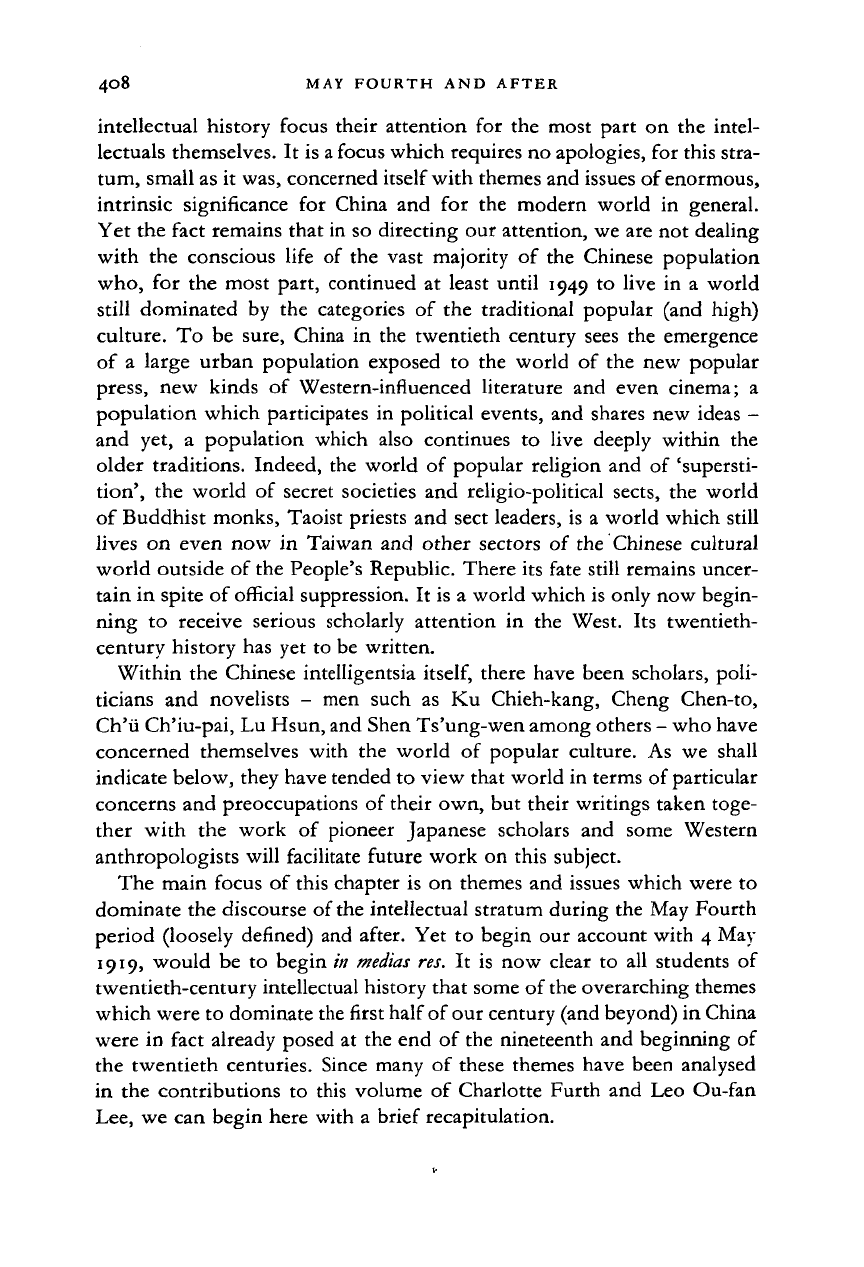
408 MAY FOURTH AND AFTER
intellectual history focus their attention for the most part on the intel-
lectuals themselves. It is
a
focus which requires no apologies, for this stra-
tum, small as it was, concerned itself with themes and issues of enormous,
intrinsic significance for China and for the modern world in general.
Yet the fact remains that in so directing our attention, we are not dealing
with the conscious life of the vast majority of the Chinese population
who,
for the most part, continued at least until 1949 to live in a world
still dominated by the categories of the traditional popular (and high)
culture. To be sure, China in the twentieth century sees the emergence
of a large urban population exposed to the world of the new popular
press,
new kinds of Western-influenced literature and even cinema; a
population which participates in political events, and shares new ideas -
and yet, a population which also continues to live deeply within the
older traditions. Indeed, the world of popular religion and of 'supersti-
tion', the world of secret societies and religio-political sects, the world
of Buddhist monks, Taoist priests and sect leaders, is a world which still
lives on even now in Taiwan and other sectors of the Chinese cultural
world outside of the People's Republic. There its fate still remains uncer-
tain in spite of official suppression. It is a world which is only now begin-
ning to receive serious scholarly attention in the West. Its twentieth-
century history has yet to be written.
Within the Chinese intelligentsia
itself,
there have been scholars, poli-
ticians and novelists - men such as Ku Chieh-kang, Cheng Chen-to,
Ch'ii Ch'iu-pai, Lu Hsun, and Shen Ts'ung-wen among others - who have
concerned themselves with the world of popular culture. As we shall
indicate below, they have tended to view that world in terms of particular
concerns and preoccupations of their own, but their writings taken toge-
ther with the work of pioneer Japanese scholars and some Western
anthropologists will facilitate future work on this subject.
The main focus of this chapter is on themes and issues which were to
dominate the discourse of the intellectual stratum during the May Fourth
period (loosely denned) and after. Yet to begin our account with 4 May
1919,
would be to begin in
medias
res.
It is now clear to all students of
twentieth-century intellectual history that some of the overarching themes
which were to dominate the first half of our century (and beyond) in China
were in fact already posed at the end of the nineteenth and beginning of
the twentieth centuries. Since many of these themes have been analysed
in the contributions to this volume of Charlotte Furth and Leo Ou-fan
Lee,
we can begin here with a brief recapitulation.
Cambridge Histories Online © Cambridge University Press, 2008
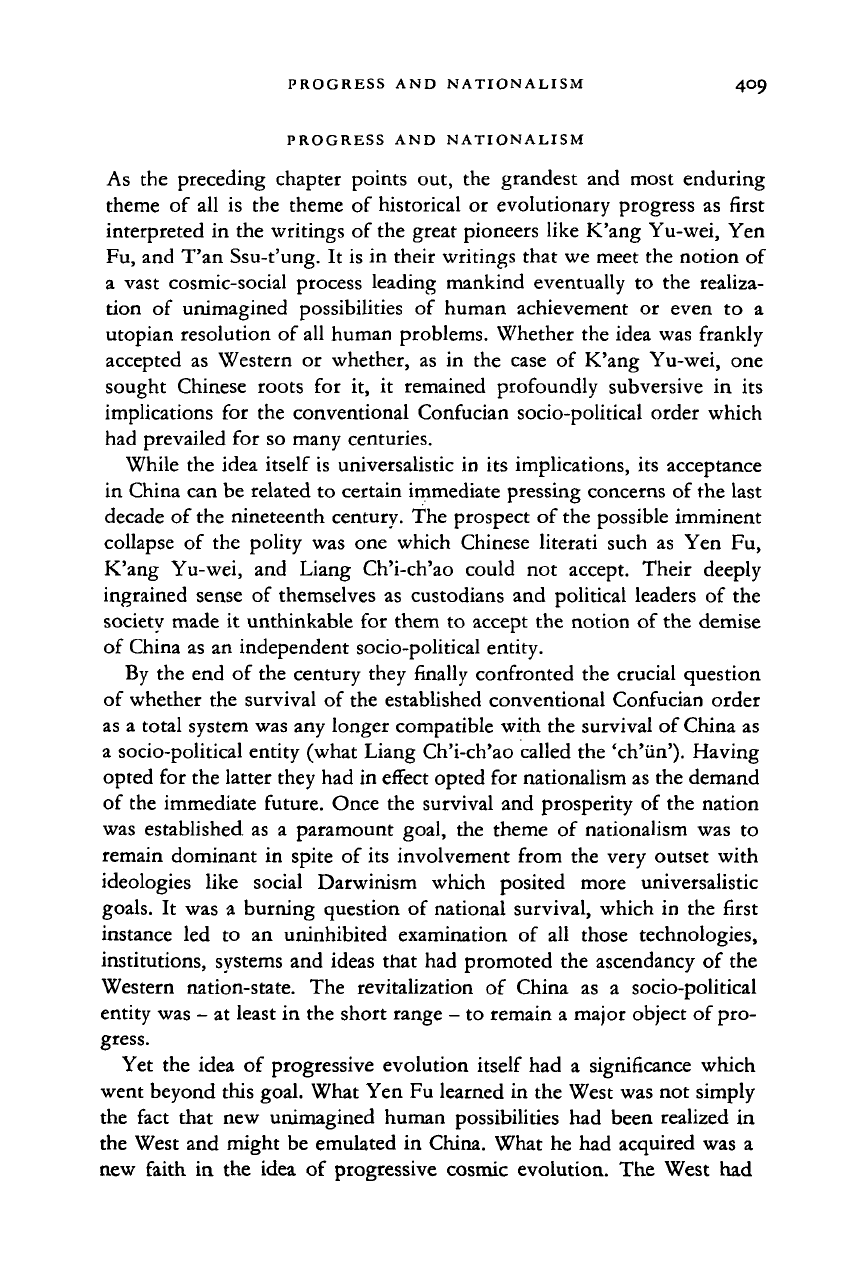
PROGRESS AND NATIONALISM 409
PROGRESS AND NATIONALISM
As the preceding chapter points out, the grandest and most enduring
theme of all is the theme of historical or evolutionary progress as first
interpreted in the writings of the great pioneers like K'ang Yu-wei, Yen
Fu, and T'an Ssu-t'ung. It is in their writings that we meet the notion of
a vast cosmic-social process leading mankind eventually to the realiza-
tion of unimagined possibilities of human achievement or even to a
Utopian resolution of all human problems. Whether the idea was frankly
accepted as Western or whether, as in the case of K'ang Yu-wei, one
sought Chinese roots for it, it remained profoundly subversive in its
implications for the conventional Confucian socio-political order which
had prevailed for so many centuries.
While the idea itself is universalistic in its implications, its acceptance
in China can be related to certain immediate pressing concerns of the last
decade of the nineteenth century. The prospect of the possible imminent
collapse of the polity was one which Chinese literati such as Yen Fu,
K'ang Yu-wei, and Liang Ch'i-ch'ao could not accept. Their deeply
ingrained sense of themselves as custodians and political leaders of the
society made it unthinkable for them to accept the notion of the demise
of China as an independent socio-political entity.
By the end of the century they finally confronted the crucial question
of whether the survival of the established conventional Confucian order
as a total system was any longer compatible with the survival of China as
a socio-political entity (what Liang Ch'i-ch'ao called the 'ch'iin'). Having
opted for the latter they had in effect opted for nationalism as the demand
of the immediate future. Once the survival and prosperity of the nation
was established as a paramount goal, the theme of nationalism was to
remain dominant in spite of its involvement from the very outset with
ideologies like social Darwinism which posited more universalistic
goals.
It was a burning question of national survival, which in the first
instance led to an uninhibited examination of all those technologies,
institutions, systems and ideas that had promoted the ascendancy of the
Western nation-state. The revitalization of China as a socio-political
entity was - at least in the short range - to remain a major object of pro-
gress.
Yet the idea of progressive evolution itself had a significance which
went beyond this goal. What Yen Fu learned in the West was not simply
the fact that new unimagined human possibilities had been realized in
the West and might be emulated in China. What he had acquired was a
new faith in the idea of progressive cosmic evolution. The West had
Cambridge Histories Online © Cambridge University Press, 2008
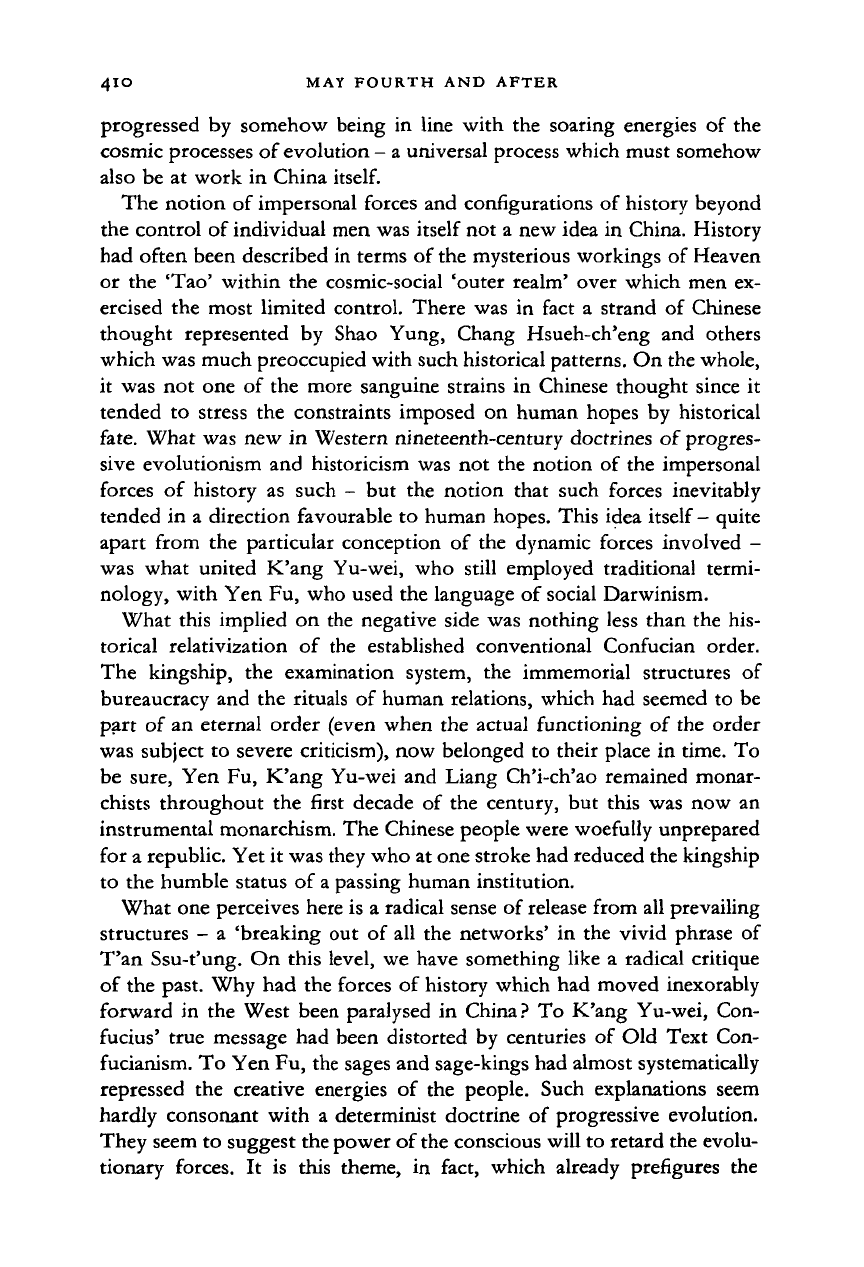
4IO MAY FOURTH AND AFTER
progressed by somehow being in line with the soaring energies of the
cosmic processes of evolution - a universal process which must somehow
also be at work in China
itself.
The notion of impersonal forces and configurations of history beyond
the control of individual men was itself not a new idea in China. History
had often been described in terms of the mysterious workings of Heaven
or the 'Tao' within the cosmic-social 'outer realm' over which men ex-
ercised the most limited control. There was in fact a strand of Chinese
thought represented by Shao Yung, Chang Hsueh-ch'eng and others
which was much preoccupied with such historical patterns. On the whole,
it was not one of the more sanguine strains in Chinese thought since it
tended to stress the constraints imposed on human hopes by historical
fate.
What was new in Western nineteenth-century doctrines of progres-
sive evolutionism and historicism was not the notion of the impersonal
forces of history as such - but the notion that such forces inevitably
tended in a direction favourable to human hopes. This idea itself
—
quite
apart from the particular conception of the dynamic forces involved -
was what united K'ang Yu-wei, who still employed traditional termi-
nology, with Yen Fu, who used the language of social Darwinism.
What this implied on the negative side was nothing less than the his-
torical relativi2ation of the established conventional Confucian order.
The kingship, the examination system, the immemorial structures of
bureaucracy and the rituals of human relations, which had seemed to be
part of an eternal order (even when the actual functioning of the order
was subject to severe criticism), now belonged to their place in time. To
be sure, Yen Fu, K'ang Yu-wei and Liang Ch'i-ch'ao remained monar-
chists throughout the first decade of the century, but this was now an
instrumental monarchism. The Chinese people were woefully unprepared
for a republic. Yet it was they who at one stroke had reduced the kingship
to the humble status of a passing human institution.
What one perceives here is a radical sense of release from all prevailing
structures - a 'breaking out of all the networks' in the vivid phrase of
T'an Ssu-t'ung. On this level, we have something like a radical critique
of the past. Why had the forces of history which had moved inexorably
forward in the West been, paralysed in China? To K'ang Yu-wei, Con-
fucius' true message had been distorted by centuries of Old Text Con-
fucianism. To Yen Fu, the sages and sage-kings had almost systematically
repressed the creative energies of the people. Such explanations seem
hardly consonant with a determinist doctrine of progressive evolution.
They seem to suggest the power of the conscious will to retard the evolu-
tionary forces. It is this theme, in fact, which already prefigures the
Cambridge Histories Online © Cambridge University Press, 2008
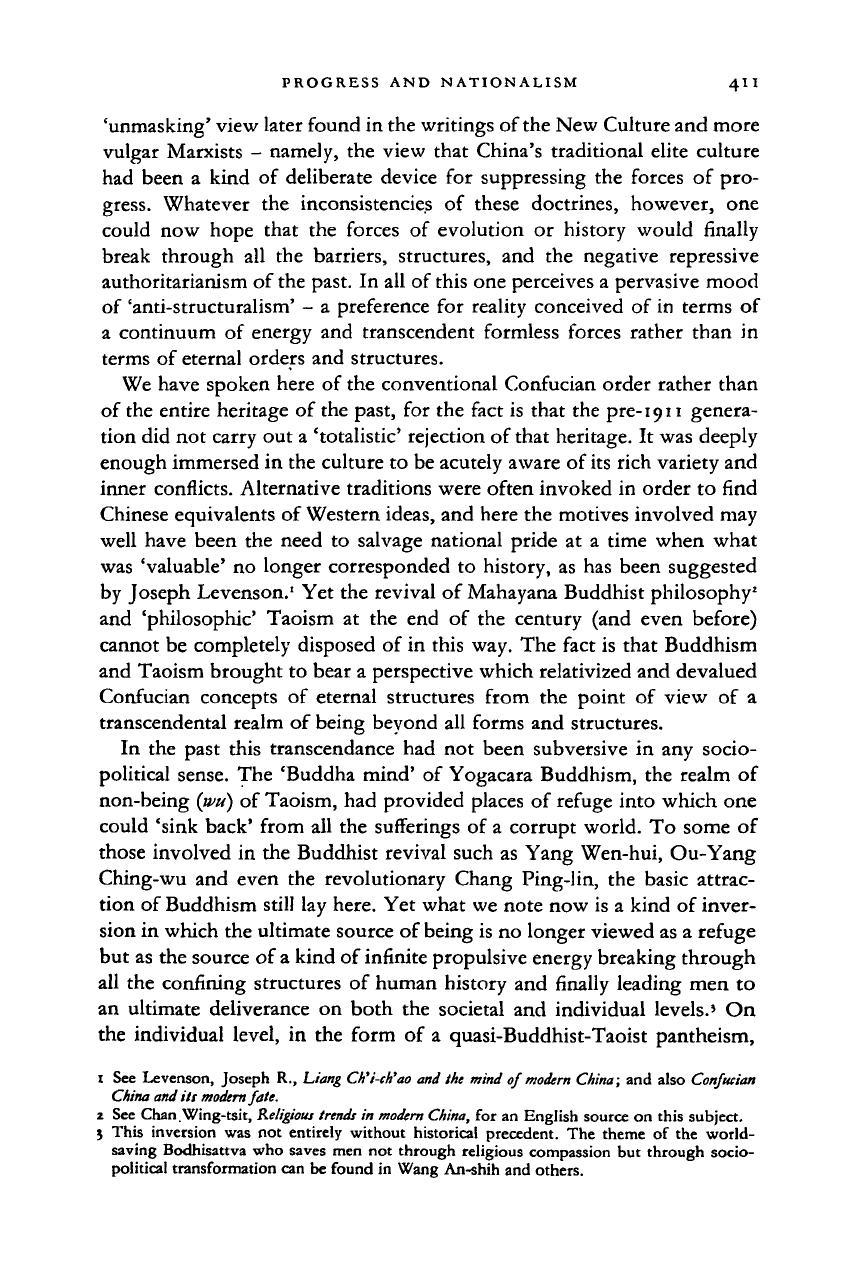
PROGRESS AND NATIONALISM 4II
'unmasking' view later found in the writings of the New Culture and more
vulgar Marxists
-
namely,
the
view that China's traditional elite culture
had been
a
kind
of
deliberate device
for
suppressing
the
forces
of
pro-
gress.
Whatever
the
inconsistencies
of
these doctrines, however,
one
could
now
hope that
the
forces
of
evolution
or
history would finally
break through
all the
barriers, structures,
and the
negative repressive
authoritarianism
of
the past. In all of this one perceives a pervasive mood
of 'anti-structuralism'
- a
preference
for
reality conceived
of
in terms
of
a continuum
of
energy
and
transcendent formless forces rather than
in
terms
of
eternal orders and structures.
We have spoken here
of
the conventional Confucian order rather than
of the entire heritage
of
the past,
for
the fact is that the pre-1911 genera-
tion did not carry out a 'totalistic' rejection of that heritage.
It
was deeply
enough immersed in the culture to be acutely aware of
its
rich variety and
inner conflicts. Alternative traditions were often invoked
in
order
to
find
Chinese equivalents
of
Western ideas, and here the motives involved may
well have been
the
need
to
salvage national pride
at a
time when what
was 'valuable'
no
longer corresponded
to
history,
as
has been suggested
by Joseph Levenson.
1
Yet the revival
of
Mahayana Buddhist philosophy
2
and 'philosophic' Taoism
at the end of
the century (and even before)
cannot be completely disposed
of
in this way. The fact is that Buddhism
and Taoism brought to bear
a
perspective which relativized and devalued
Confucian concepts
of
eternal structures from
the
point
of
view
of a
transcendental realm
of
being beyond all forms and structures.
In
the
past this transcendance
had not
been subversive
in
any socio-
political sense. The 'Buddha mind'
of
Yogacara Buddhism,
the
realm
of
non-being
{wu)
of
Taoism, had provided places
of
refuge into which one
could 'sink back' from all the sufferings
of
a corrupt world.
To
some
of
those involved
in
the Buddhist revival such
as
Yang Wen-hui, Ou-Yang
Ching-wu
and
even
the
revolutionary Chang Ping-lin,
the
basic attrac-
tion of Buddhism still lay here. Yet what we note now is
a
kind
of
inver-
sion in which the ultimate source of being is no longer viewed as
a
refuge
but as the source of a kind of infinite propulsive energy breaking through
all the confining structures
of
human history and finally leading men
to
an ultimate deliverance
on
both
the
societal
and
individual levels.'
On
the individual level,
in the
form
of a
quasi-Buddhist-Taoist pantheism,
1 See Levenson, Joseph
R.,
Liang
Ch'i-ch'ao
and the mind of
modern
China; and also
Confucian
China and
its modern fate.
2 See Chan Wing-tsit,
Religious trends
in
modern
China,
for an English source
on
this subject.
j This inversion
was not
entirely without historical precedent.
The
theme
of the
world-
saving Bodhisattva who saves men
not
through religious compassion
but
through socio-
political transformation can be found
in
Wang An-shih and others.
Cambridge Histories Online © Cambridge University Press, 2008
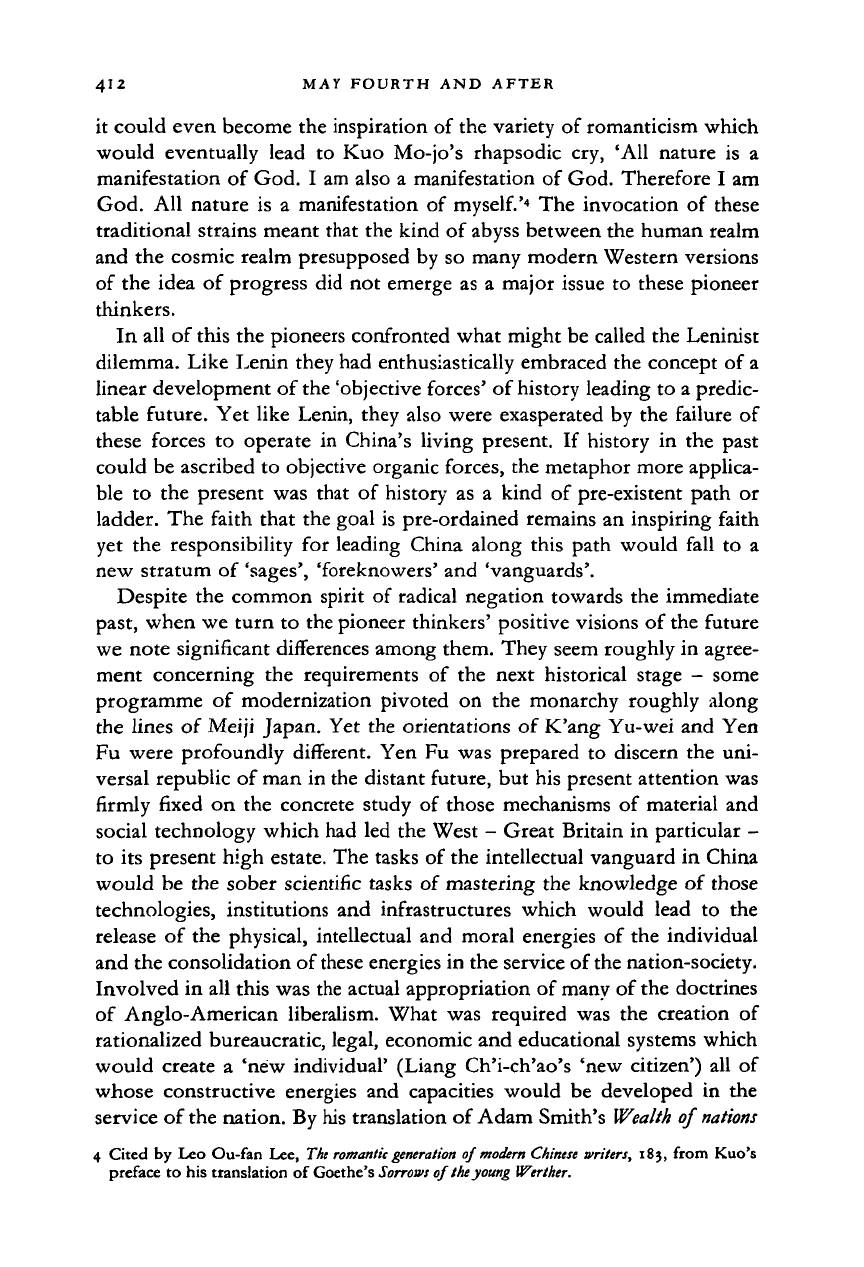
412 MAY FOURTH AND AFTER
it could even become the inspiration of the variety of romanticism which
would eventually lead to Kuo Mo-jo's rhapsodic cry, 'All nature is a
manifestation of God. I am also a manifestation of God. Therefore I am
God. All nature is a manifestation of
myself.'
4
The invocation of these
traditional strains meant that the kind of abyss between the human realm
and the cosmic realm presupposed by so many modern Western versions
of the idea of progress did not emerge as a major issue to these pioneer
thinkers.
In all of this the pioneers confronted what might be called the Leninist
dilemma. Like Lenin they had enthusiastically embraced the concept of a
linear development of the 'objective forces' of history leading to a predic-
table future. Yet like Lenin, they also were exasperated by the failure of
these forces to operate in China's living present. If history in the past
could be ascribed to objective organic forces, the metaphor more applica-
ble to the present was that of history as a kind of pre-existent path or
ladder. The faith that the goal is pre-ordained remains an inspiring faith
yet the responsibility for leading China along this path would fall to a
new stratum of 'sages', 'foreknowers' and 'vanguards'.
Despite the common spirit of radical negation towards the immediate
past, when we turn to the pioneer thinkers' positive visions of the future
we note significant differences among them. They seem roughly in agree-
ment concerning the requirements of the next historical stage
—
some
programme of modernization pivoted on the monarchy roughly along
the lines of Meiji Japan. Yet the orientations of K'ang Yu-wei and Yen
Fu were profoundly different. Yen Fu was prepared to discern the uni-
versal republic of man in the distant future, but his present attention was
firmly fixed on the concrete study of those mechanisms of material and
social technology which had led the West - Great Britain in particular -
to its present high estate. The tasks of the intellectual vanguard in China
would be the sober scientific tasks of mastering the knowledge of those
technologies, institutions and infrastructures which would lead to the
release of the physical, intellectual and moral energies of the individual
and the consolidation of
these
energies in the service of the nation-society.
Involved in all this was the actual appropriation of many of the doctrines
of Anglo-American liberalism. What was required was the creation of
rationalized bureaucratic, legal, economic and educational systems which
would create a 'new individual' (Liang Ch'i-ch'ao's 'new citizen') all of
whose constructive energies and capacities would be developed in the
service of the nation. By his translation of Adam Smith's
Wealth
of
nations
4 Cited by Leo Ou-fan Lee,
The romantic generation
of
modern Chinese
writers, 183, from Kuo's
preface to his translation of Goethe's
Sorrows
of the young Werther.
Cambridge Histories Online © Cambridge University Press, 2008
